Featured photo courtesy of the Vertile Foundation. I nominated Vertile Foundation this year to be a part of Dr. Bronner’s Employee Contribution Program, which allows us to nominate organizations that we think deserve more attention. Once five organizations have been selected, they are presented by each of the five employees who nominated those organizations at our quarterly staff meeting. Every one of Dr. Bronner’s 200+ employees decides which organization they want to direct funds to, and the company donates $100 on each employee’s behalf to the organization of their choice.
I have known Rico Changeux through Boulder’s dance community for years. I am inspired and moved by the work he is doing with Vertile Foundation. I was excited to sit down with Rico as well as Melissa Roza, Vertile Foundation’s Executive Director, to talk to them about the work they are doing in Haiti.
Rico, tell me a little bit about your background and how you got interested in starting Vertile Foundation.
RICO: I’m a professional dancer. I started the Vertile Foundation right after the earthquake in 2010. I went down there with PBS and Engineers Without Borders based out of The University of Colorado—they needed a translator. We did an assessment in Haiti. I wanted to help my people, but I didn’t know how to help them. Being from Haiti, I had my house there. They did an assessment on the house to make sure it wasn’t damaged, and it was still earthquake proof.
That was my family home I grew up in until I was 10 years old. I came back home, then this idea popped up to me like, hey, why don’t I just take my family home that’s just sitting there, and turn it into something to help kids. I realized when I was down there, a lot of people were helping the elderly, but nobody was looking out for the kids. There were kids being kidnapped, taken to different countries and being used for sex trafficking.
From that point on, that’s what I wanted to do. I went back to the University of Colorado and told Engineers Without Borders’ co-founder Bernardo and several of his other people, that I want to start this foundation to help kids. Since my house was solid and earthquake proof, would you guys be willing to go back with me and help me start this? They said they don’t to be in charge of it, but they can help build it to make sure that it is built properly. They came back with me like two or three times to help me figure the logistics out.
The name, which was my mother’s, this was my mom’s house in Haiti. She passed away when I was 17 years old, a senior in high school. And that’s how the name became Vertile Foundation.
Can you tell us more about her and what you find inspirational about her?
RICO: Inspirational [Sighs]. I’m not going to get emotional! We had our family that was six of us living together, but we also had all these other kids within that neighborhood that used to always come to our house. My mom would be making dinner and this kid would just come and hang out with us, it was like a normal thing—it’s almost like those kids were part of our family as well. She would cook dinner, and breakfast and just feed us. And we just ate together as a family. We never thought anything of it, these people were not related to me, but it was just the norm. And she just was always doing that.
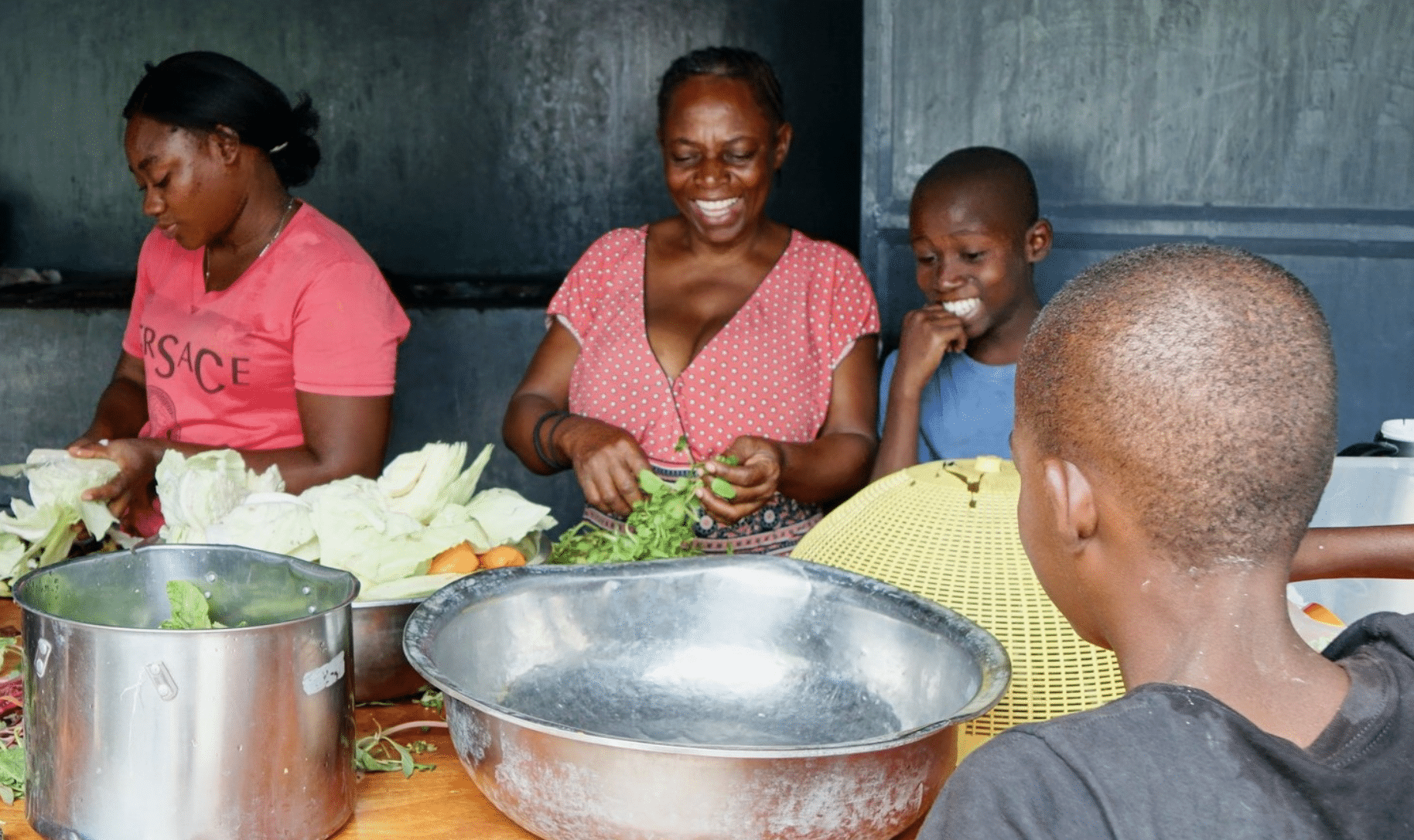
Every time we needed food it’s like, “hey, let’s go to the house and then eat and stuff.” She always had food for us and our friends. She was a person that would give, and if the kids needed help with school or if they didn’t have the right outfit she would figure out a way to get the money and buy these kids stuff. So she was always giving—it was normal. It was not until I came here, I started realizing, oh wow, she was such a big help to these kids because they didn’t have a place to eat or anything.
Or if they had a question about anything, they would come to her, and they would never go to their own house. They felt totally comfortable coming and asking her whatever they needed to. And then it was safe because she kept everything very private, like one-on-one conversations. It just made perfect sense for me to call it her house because that’s who she was as an individual woman and that is how I see myself, as a man, just to be able to give back to kids that don’t have what they need.
That is awesome, I love that story. From there, how did you locate children that Vertile House could serve once it was ready?
RICO: There was never a time when it was completely ready. I mean, I didn’t know what I was doing. How do you even create something like that? I came back to Boulder and I talked to a lawyer and I was like, “Hey, how do I make a nonprofit?” He said, “Wait, you don’t know how to do any of this?” I’m like, “I have no idea! I just want to help these kids. How do I do this legit?” Because I didn’t want to just go and help kids—I wanted to make sure it was official. For two or three years, I was literally doing it myself. I used to work, and whatever money that I would make I would send it to Haiti to help feed kids.
I started realizing that I needed a lot more help. So I created the non-profit. The engineers came with me and they helped me figure out logistics. I had 10 rooms in the house, so I bought beds and I would interview people that actually really needed help. Manshelove was the first child we took in. Her mother passed away when she was young, and she lost her father in the earthquake. She pulled herself out of the rubble and wandered for days, eventually finding us.
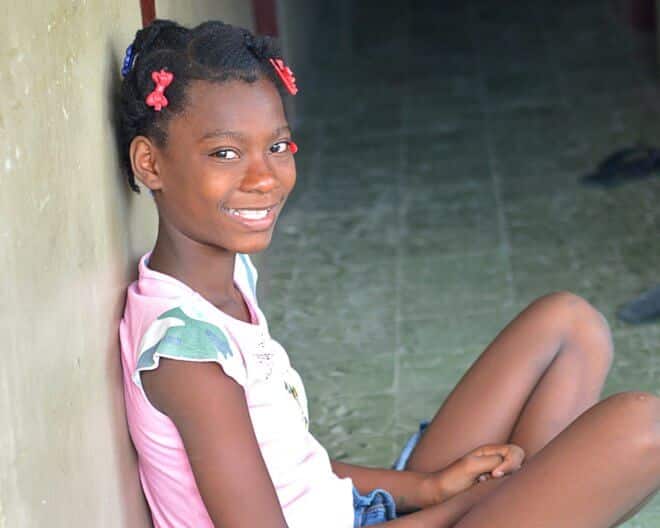
RICO: It was a sad case, but at the same time I knew that I wanted to help this child to give her a life after what she’s been through. I put her into school, fed her and created this home, which became her home. It was a very hard story to take in, knowing that her father was still there, but not even a father because he doesn’t have the means to help her. She is now 16, she is still at the house and she’s doing great. Talk about a life story: from a person that didn’t have anything that has so much now. She is one of the highest persons in her grade level. She takes school very seriously and she loves to help all the other kids. She loves—loves dancing. She is really good at it, super flexible. She’s a leader. I always say this, and always stuck with this. If I’m not around anymore to continue this legacy, she would be the person that would take it over, so it’s pretty cool to see that.
What do you want people to know in general about Haiti and about the children that you’re serving?
RICO: Haiti is a very complex country. It has been through so many different things, drastic changes and constantly getting supported by the NGOs. In Haiti, people are constantly giving money, giving money, giving money. But at the same time, the corruption over there, you give money and then it’s gone. So it doesn’t even get to the country. I always say this, if you took Haiti and then took everything off, broke everything and started everything, you could actually build a mini San Francisco in Haiti with the amount of money that they received.
MELISSA: The government is broken and corrupted. Money from USAID is feeding into and being managed by a broken system. That’s why there are protests there all the time. It’s been proven that the sitting president, has funneled a ton of aid money out into his own personal accounts. He owns a bunch of banana farms and he renamed them to make them sound like road contracting companies because they don’t have a road.
That’s what’s really lacking there—the infrastructure. The utility companies were never rebuilt after the earthquake. 37% of the country has no power at all. If you’re lucky, you get power to the houses around 11 or 12 at night and it turns off by six in the morning. If we’re there on a volunteer trip, it could be once in a week or five nights in a week. It’s completely inconsistent, so you can’t plan on it. The places that do have to have power, like schools, run it on gasoline generators, which is not affordable and terrible for the environment. What I like about the Vertile Foundation is that the money goes directly to the kids and to the program. There is such a need there.
The first time I went there, I’d never seen anything like it. It’s amazing that it is two hours from Miami. That level of poverty, the trash, kids running around completely unattended to, nobody’s in school. The nice thing about the smaller organizations is that the money is well managed. We’re a full volunteer operation, so all of the money we raise goes directly to our programs. The main program we have now is the house where we have a home for abandoned children. We want to move that out into the countryside where it’s cheaper, where we can expand it, take in more children and where it will be closer to the school that we built.
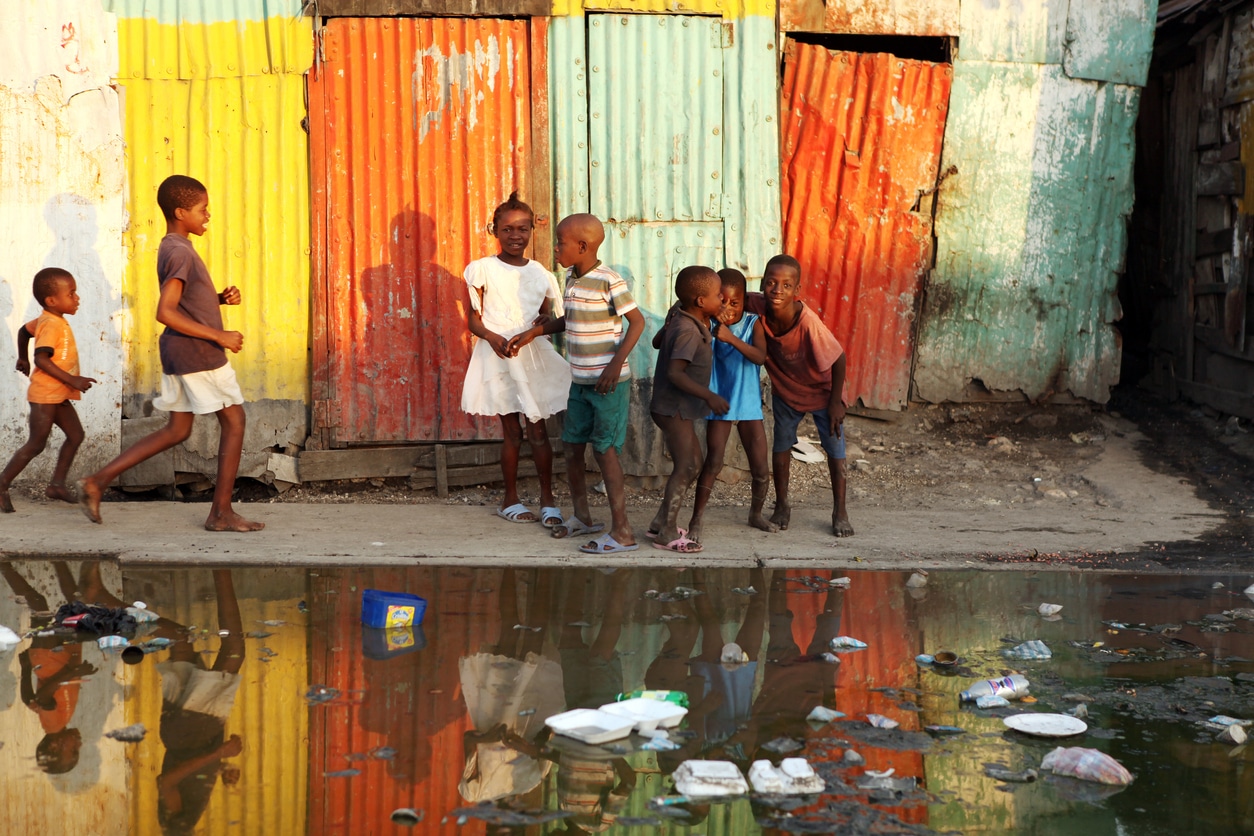
Education is kind of the key there. Only one in five kids makes it past the sixth grade and there’s no way out of poverty without an education. We can only take in so many kids, and for those kids, we’ve completely changed the trajectory of their life. We can touch a lot more kids if we provide a great middle school and secondary school education. People really do help each other out. Opening a school is our main focus that we’re raising money for now.
We did an open house in April for the new school and we had some computers that we brought in. There was no power so we were running them off of our phones. We got 12 laptops donated and we had a couple of tablets that we linked to our phones. We brought Fifth Box, the company from Boulder that has games for coding to teach kids how to code. It’s super fun and the kids love it. We didn’t really think through the fact that most of these kids had never sat at a laptop before. It took us forever to teach them how to do it! They have no idea what a keyboard is or anything. The cool thing was, the kids from Vertile House were there and they were teaching them. They get computer lessons at Vertile House three times a week after school.
The way to bring Haiti out of poverty is through education and helping people open small businesses. With that you can do well and give back to your community. It’s not by giving billions of dollars to the government, because it disappears.
Tell me more about the training and education you are offering right now in the house.
RICO: What we try to do, like Melissa was saying, is give them an opportunity to create jobs to help them have a better future. They’re not only going to school, coming home and doing their homework and that’s it. They have to do more, and we’ve been bringing in computers so we can educate them on how to run basic software or learn how to code. We run a whole summer camp, kind of like entrepreneurship, to teach them how to start a small business.
The education that they’re getting within the house they also get to share that within the neighborhoods. It’s not just for these kids right here, but it’s also for the whole community at large. Since opening the school our kids have way more education from our programs to help the other kids at the school. They’re all trying to help each other out and if we can give them the proper education, the proper tools to actually create those jobs, then they will also want to help the community around them.
And it seems like they have some fun too!
RICO: Oh, they always have fun. I mean, it’s interesting, right? The first time we brought the laptops in we hooked up Fifth box and they were working on them until 11 o’clock at night! We were like, “you have to go to bed,” and these kids did not want to go to bed. They are like all kids, they don’t want to get off the electronics, right? To see them create these things, to see their faces shine. We have some pictures of them working at night, they could barely stay awake, but it was so cool to see from that perspective the stuff that we take for granted here. The things that we have here we can get whenever we want. When you go to a place where they don’t have access to that stuff, it makes us wonder if you can learn more when we go back home. That experience itself, there are no words for it. It’s the little things that we do that makes a huge difference in the kids’ lives.

MELISSA: I know Dr. Bronner’s is very focused on the environment—there’s no trash collection and so they burn the trash that just piles up. There is a video on our website that shows a huge pile of trash right outside of where the house is. It is so huge, you can’t get the car past it. Someone occasionally comes and picks it up in the middle of the night, and then the next day everyone just throws their trash out into the road. That’s why we’re trying to get out of that area.
RICO: We have to train our kids and say, “Hey, we don’t do that.” You have to remember if you eat something, or drink a bottle of juice, you can’t just toss it. I had to train them to actually throw it away or keep it in their car.
MELISSA: We said no more plastic bags of water because they’re everywhere. We have to teach them this because if there’s trash everywhere, it’s never going to get better, and nobody’s ever going to be thinking about the fact that they are producing all of this.
So there’s no garbage collection coming from the House?
MELISSA: I’ll give you some statistics on Haiti. Only 25% of people have access to a toilet. The sanitation system is bad. Most people don’t have power. Only one in five kids makes it past the fifth grade. 22% of kids have their growth permanently stunted because they’re too hungry. 50% of kids are drinking contaminated water.
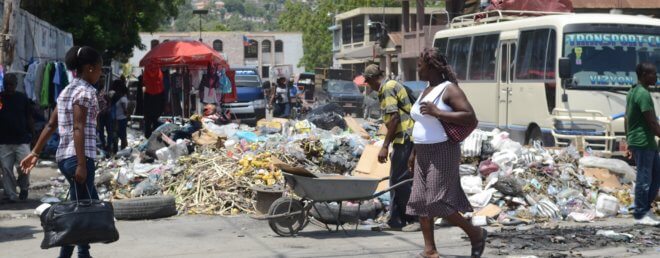
I love Haiti. I love Haitian people. And if you don’t get to know the people and you just drive through there, it’s a sad, sad place. If you do get to know the people and the country, it’s beautiful—it’s right next to Turks and Caicos [a popular Caribbean tourist destination]. You can, with not very much money, make a huge difference there. I think Subsaharan Africa is the only other place like that, where you can really make a big impact.
That’s why I was personally excited to recommend the sponsorship from Dr. Bronner’s because I knew that the funds would be immediately useful and they would go far. How did you connect, Rico and Melissa, to start working together?
MELISSA: I went to Rico’s dance studio, and I saw the pictures of all the beautiful kids and the house. It’s a beautiful country and the kids are just gorgeous. And I thought, I want to go down. My oldest son is adopted from an orphanage in Russia. We travel a lot and I take my kids to orphanages in Mexico and all over the world. So I wanted to go see it. They were doing a volunteer trip last July, and I went on that trip and fell in love with it. I got more involved. I used to plan weddings in Europe, so I have an event planning background and I helped out with the fundraising gala for Vertile Foundation. Then over time, I think it was in December, they asked me to become the Executive Director.
That leads us to the school. Why don’t you give us an idea of the size, what it’s taking to build it, what it’s going to look like, ages and the main focus for Vertile Foundation overall.
MELISSA: We have a donor here in Denver that gave money to buy some property. She’s a big believer in lifting kids out of poverty and she’s more focused in the United States. But Rico went to her with this idea about some property with some existing structures on it about 45 minutes from where we have the house in a much nicer area with trees and grass. We bought the property, and we raised the money at the gala to build it out, and add a computer lab. We finished it 95% of the way in April for the open house.
It’s going to start as a middle school because that’s when most people drop out of school—because there aren’t a lot of good choices. If you watch the video on our website, we show the best middle school in the area, and you would not believe it. It looks like what you’d imagine in like Syria or a war-torn country. We’re going to start with seventh grade in September. We’re still raising money to finish solar power for the school, so that’s our main little project right now. Then we’ll grow eventually into eighth grade.
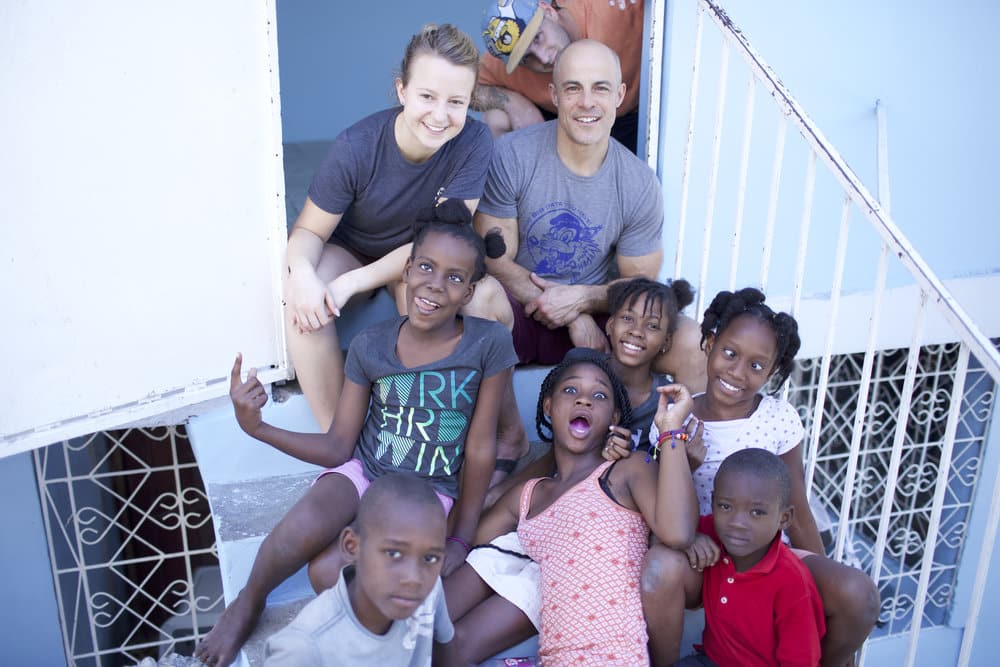
The school system there is based on the French system. It’s 13 grades and very few kids are getting through school, but to make it even harder you have to take these tests to pass from sixth grade into seventh grade, from ninth grade into 10th grade, etc. If you don’t pass these tests you can’t retake them, you have to go back and repeat the grade. You pay for school, and the uniforms can be as expensive as the tuition. So it’s like a sense of pride that you get to go to school. The parents want everybody to know that their kid gets to go to school. They have to buy these really expensive, elaborate uniforms, like a different color for every day and you can’t go to school without your uniform, but you can go to school if you’re not paying your bills. That’s why these schools fail because people can’t afford it all. The teachers aren’t getting paid and so it’s a big problem.
We’re trying to change the way they think about it, and we bought patches. We have 500 patches that we’re bringing down and they have the logo of our school and you get the patch for free and you can sow it onto a white shirt. It’s just trying to teach a different way of thinking about things like that.
We have to teach their curriculum, but in the afternoon instead of cooking and sewing we’re going to teach entrepreneurial skills. For example, how to write a resume, how to use a computer. We’re going to require a community involvement project. We want these people to be community leaders. We had community leaders come and speak at the open house and we want them to be mentors. Even if you go through school, it’s like the United States, it doesn’t guarantee that you’re going to have a good paying job and be able to support your family. So we want to teach this different way of thinking and give them the skills to support themselves and their community.
We found an amazing executive director of the school and he brought in some phenomenal people who are excited to try something new. It’s the first kind of school like this in its area and we have a lot of interest.
How many kids to start?
MELISSA: We have interest for up to 50, but we’ll see who we can really accommodate and who actually shows up on the first day. There’s a big difference between the interest and who actually is sitting there on the first day in September.
RICO: We have the capacity of about 150 to 200.
You’re opening in September, but it’s a work in progress.
RICO: It’s a new school and its different, and so people don’t know what to expect—but they know that they want to be a part of it.
MELISSA: Church groups will come in from other countries and raise money, usually interest fades or it runs out of money. There is this thought, “are you really gonna be here for the long run?” We have to prove ourselves a little bit.
In Haiti the native languages are Haitian and Creole, but the schools teach in French and a lot of kids don’t know how to speak it, because they don’t speak it anywhere outside of school. The curriculum is very complicated, all the textbooks are in French and it makes the learning is difficult. It’s been easy for us to attract really good teachers and administrators, because they want to try something different. For example, It’s not very common, but we teach English at the house and we’re going to teach it at the school. We will have to raise money in the coming years buy more land, expand out and have enough classrooms to be a full secondary school. This and moving the house are our two big projects.
What would you think these funds from Dr. Bronner’s would be useful for directly?
RICO: Solar power is the biggest one.
MELISSA: The school’s wired. We just need to get the equipment and install it.
Learn more about and give to the Vertile Foundation by visiting their website here.